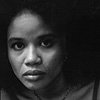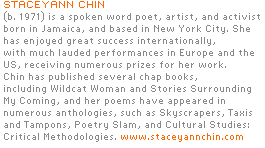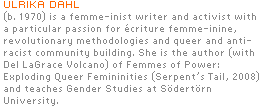| 
|  | | 
|  |  | 
|  |  | 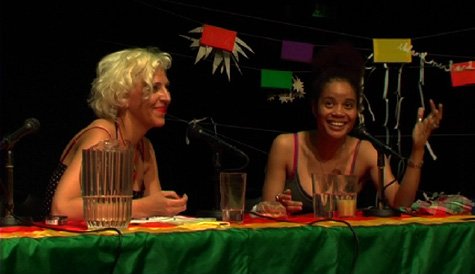
|  | | 
|  |  | UD: It’s really great to see you again, Staceyann! SC: It’s great to see you again too, although you have more hair now than you did last time. UD: That’s very true, I do. Maybe we’ll get to the question of hair later on… So, obviously, this is a queer literary festival and there are lots of things to talk about in terms of activism and art. Last time we talked was at a panel during Stockholm Pride four years ago with Alex Olsen, Doria Roberts and Del LaGrace Volcano. I think we’ll be touching on some of the questions that we were touching on then: how to make art and how to be an activist and an artist, and that kind of stuff. But to get us started: what have you been up to since we last saw you here in Sweden? SC: What have I been up to? Well, I’ve certainly had some girlfriends and lost them. But that seems to be a constant in my life – you know, they appear and then they disappear. Lesbians are like magicians. First we’re in love and then we’re not in love and then we’re friends and then I have to meet your current girlfriend and then you have to meet my current girlfriend and we all have to pretend we’re really all friends even though we want to stab each other in the neck with forks. UD: Is that what you do in New York? SC: No, I’ve been traveling and performing… My goal is always to articulate, not just my identity because my personal identity is no more under attack. You know, I show up and people roll out the equivalent of the queer red carpet and go running for apple juice because I said I would like something with sugar. So my personal life is very different from the life I started articulating ten or eleven years ago when I first went to America. I think now what I work hard to do is to articulate the identities that are still under the attack of racism and sexism. I represent the women of Jamaica who are unable to travel across borders to speak about their identities and their lives. I talk about people who are poor, and I suppose I represent people who might come to Sweden, who might find themselves invisible, or might find that they come up against larger things than what they are able to deal with. So I’m always writing, I’m always performing. I started on a book, that will be published next year.[1] It talks about growing up in Jamaica, about what it was like living in such a gendered identity, about being a kid with a loud mouth, about being abandoned. |  | 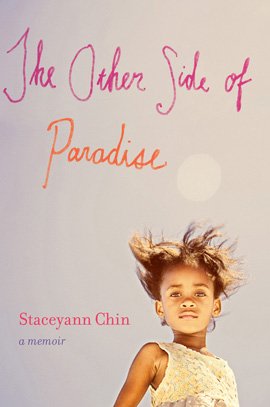
![[1] Staceyann Chin, The Other](Resources/attenpixel4a2.gif)
| 
|  |  | To me, when I look behind me, it seems like I haven’t been up to much. So when people say “oh, you’ve been up to so much, and I saw you in this and that”, it’s kind of like I’m doing the same thing every day. One day Oprah might be interested, and another day someone in Gothenburg might be. It’s the same conversation and it doesn’t feel very different to me. I’m just plotting along and trying to do my part in a process of changing the world and making it better. UD: This new book, is it a different kind of writing? SC: It’s prose, not poetry. I haven’t put a published book of poems out because I think it takes a really long time to become a poet. And I don’t think I’m quite there yet. I’m still working on the craft of writing poems and what they might be if they were good poems. I articulate my identity within the work that I do, but I feel like some of it is still very clumsy in the craft. So hopefully, by the time that I’m forty, I’ve mastered twelve of fifteen poems to put together to a collection of work and put an ISBN-number on it. I think that we are a generation of do-it-quick and microwave and amazon.com and downloading music right away. I was raised by a woman who was sixty years old when I was born, so I’m a slow-burn kind of girl. |  | | 
|  |  | 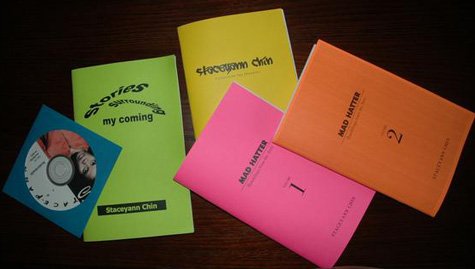
|  | | 
|  |  | UD: But you have published some chapbooks. I was talking to a friend of mine the other day about this conversation, and she said “Staceyann’s work got me through a really hard break-up from my girlfriend”. So obviously, whether it’s a proper collection of poetry or not, you’re doing a lot of good work. SC: Well, I can write “my girlfriend has left me and I’m so sad here on the bathroom floor”, I’m very good at those poems because I’ve had so much practice. I’ve been fairly intimate with a lot of bathroom floors across the globe. Because there is always some woman being left or leaving me. That is always easy drama for straight people to peer into. UD: Is that not good poetry to write? SC: I don’t think that these utterances we make are invaluable. But I think that if you’re going to be a filmmaker, then you work hard at the craft of filmmaking. Not because you’re gay or black, and not because the film has to be good, but because it is important. Especially in this heteronormative white culture where our voices aren’t visible. I don’t think that people walk around and say “I haven’t had a black doctor perform surgery on me. I want the doctor who is black to perform the surgery regardless of whether he’s good or not”. It’s a very delicate conversation, the conversation that America is having around race and gender right now in the political campaign. Nobody can critique Obama because everything sounds like racism, and nobody can talk about Hillary because everything sounds like they’re being sexist. So, it’s a weird situation. When the mainstream provides space for a kind of marginalized voice, that voice becomes a voice that we are inclined to protect rather than critique. And sometimes that is problematic. UD: What constitutes good art or good poetry? SC: Of course that’s very subjective, I just can talk about what I like. You know, some people don’t need all that extra schooling. You sometimes meet a young poet who has a sensibility with words that’s just breathtaking and amazing. And you know that you should just leave that kid alone and let it find his own voice, or her own method. |  | | 
|  |  | 
|  |  |
|
